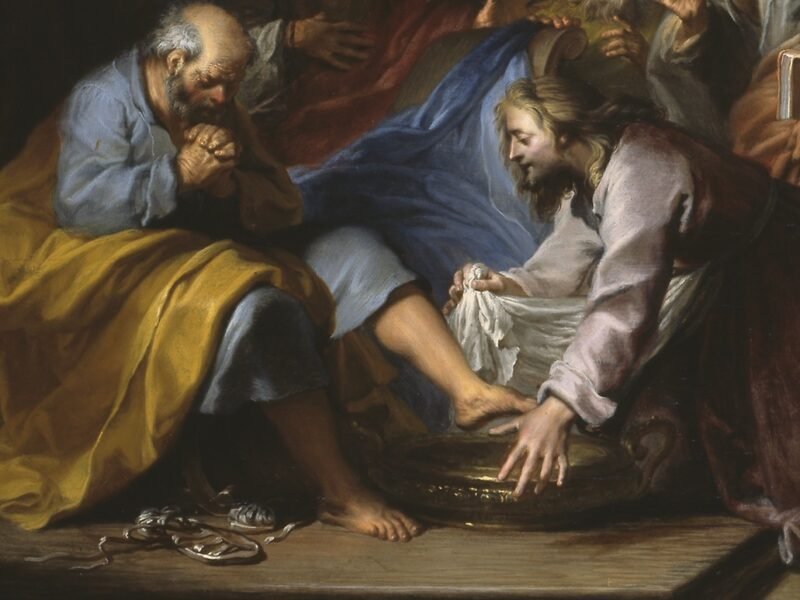The first time I ever preached on Psalm 24, I was struck by John Calvin’s gloss on verse eight. He wrote, “Mount Sion, it is true, is not at this day the place appointed for the sanctuary, and the ark of the covenant is no longer the image or representation of God dwelling between the cherubim; but as we have this privilege in common with the fathers, that, by the preaching of the word and the sacraments, we may be united to God, it becomes us to use these helps with reverence; for if we despise them by a detestable pride, God cannot but at length utterly withdraw himself from us.”[1] I was a Presbyterian at the time, but as an Anglican, I cannot help but be struck by how deeply the Book of Common Prayer drills this into us.
It would help for us to first examine what Psalm 24 is about. There are three divisions. First, there is the claim that all of creation is God’s, and therefore, it is right and meet for creation to worship Him (v. 1-2). Second, the Psalmist states that God wants a holy people to worship Him, for He is holy (v. 3-6). Third, the Psalmist declares the triumphal entry of God into His temple so that he can be in the midst of His people (v. 7-10). Now that we have a rough outline of Psalm 24, it is natural to ask, what does Psalm 24 have to do with the Book of Common Prayer? I answer that the Psalm summarizes what the Book of Common Prayer teaches us: that God deserves worship, that God demands that those who worship Him be holy, and that God makes his people holy by dwelling with them through the Spirit of Christ.
First, we observe that God demands worship. Psalm 24: 1 states that “the earth is the Lord’s.” Why? Because “he has founded it upon the seas and established it upon the rivers” (v. 2). The earth is the Lord’s because he made it. Because he made it, he is able to demand worship, especially of those whom he created in His image. St. Hilary meant as much when he wrote, “It behooves us also to render unto God the things that are His, namely, body, soul, and will. For Caesar’s coin is in the gold, in which His image was portrayed, that is, God’s coin, on which the Divine image is stamped; give therefore your money to Caesar, but preserve a conscience void of offense for God.”[2] The Book of Common Prayer picks up this theme in her services. In Morning Prayer, one has the option of sing, “O ye Children of men, bless ye the Lord; praise him, and magnify him for ever” out of the Benedicte, omnia opera. In Evening Prayer, one can sing Psalm 67 when it states “Let the peoples praise thee, O God: yea, let all the peoples praise thee.” In the Order of Holy Communion, one recites the Ten Commandments weekly, including “Thou shalt have no gods before Me.” And of course there is the monthly recitation of the Psalter and its regular exhortations to worship. To pray according to the Book of Common Prayer is to acknowledge that God demands worship.
This leads to my second point, God demands that those who worship Him be holy. The hill was where the Temple was located. And who shall ascend the holy hill to be with a holy God? “He who has clean hands and a pure heart” (v. 4) for they “will receive blessing from the LORD” (v. 5). God will have no unholy people in His presence. In the Homily on the Right use of the Temple, the author writes, “Note (beloved) what quietnesse in gesture and behaviour, what silence in talk and word, is required in the house of GOD.”[3] What is remarkable is that for the author, the temple is the church. God is to be worshiped in holiness. The Exhortation before Holy Communion reminds us, “if any of you be a blasphemer of God, a hinder-er or slanderer of his Word, an adulterer, or be in malice, or envy, or in any other grievous crime; repent you of your sins, or else come not to that holy Table.” Those who have communed with God pray from the liturgy that “our souls and bodies, be a reasonable, holy, and lively sacrifice unto (Him).” One can only be with God if one is holy and one can only claim to be of God if one is holy. However, this leads to a conundrum: who is holy enough to commune with a holy God? Who can claim the blessing?
The disparity between God’s holiness and our lack of holiness leads to my third point: God makes His people holy by dwelling with them via the Spirit in Christ. In verse 7 it is proclaimed “Lift up your heads, O gates! And be lifted up, O ancient doors, that the King of glory may come in.” We must remember that Israel had nothing in herself to deserve the gift of the Lord’s presence. “It was not because you were more in number than any other people that the LORD set his love on you and chose you, for you were the fewest of all peoples, but it is because the LORD loves you” (Deuteronomy 7-8a). The Lord knew that Israel was sinful. Because of this, He instituted the Temple as a way of allowing Israel, a sinful people, to dwell with a holy God. However, the author of the letter to the Hebrews states that the temple was “a copy and shadow of the heavenly things” (8: 5a). For “when Christ appeared as a high priest of the good things that have come, then through the greater and more perfect tent (not made with hands, that is, not of this creation) he entered once for all into the holy places, not by means of the blood of goats and calves but by means of his own blood, thus securing an eternal redemption” (9: 11-12). Those of us who are in Christ now dwell with Him in the heavenly temple.
The Book of Common Prayer makes manifest God’s provision to His people. Morning and Evening Prayer begin with a call to confession of sin and an absolution. It acknowledges that “We have erred and strayed from (His) ways like lost sheep: We have followed too much the devices and desires of our own hearts: We have offended against (His) holy laws.” But with the absolution we are forgiven and are reminded that the Lord “desireth not the death of a sinner, but rather that he may turn from his wickedness and live.” Holy Communion begins with the Collect for Purity, which acknowledges that it is the Holy Spirit that cleanses us so we can “perfectly love” and “worthily magnify” the Lord. This dependence on the Lord continues through the Communion liturgy with the confession of sin (“We acknowledge and bewail our manifold sins and wickedness”), the absolution (for He has “promised forgiveness of sins”), and the Prayer of Humble Access (“whose property is always to have mercy”). Our liturgy teaches us this simple truth: that God’s grace makes us worthyworshipers. Or to quote, Article XI “We are accounted righteous before God, only for the merit of our Lord and Saviour Jesus Christ by Faith, and not for our own works or deservings.”[4]
This leads to my original inquiry: what does Psalm 24 have to do with the Book of Common Prayer? We are taught that we are to worship the Lord, that we are to worship the Lord in holiness, and that it is the Lord who makes us holy. While we no longer worship in Jerusalem, we now “lift up our hearts” and sing “Holy Holy Holy” as we commune with our Lord via the bread and the wine. While in the Old Testament, blood of goats had to be shed continually, now we can approach the throne of God because of Jesus’ “full, perfect, and sufficient sacrifice, oblation, and satisfaction for the sins of the whole world”. And while our Lord is in heaven, He did not leave us alone, but gave us His Spirit. Our Triune God is always drawing all men to themselves. And now, in these last days we have the Spirit to make us worthy worshippers. It is the Spirit who gives us a new heart through the preached word so that we can believe in Christ. It is the Spirit who cleanses and sanctifies us through the prayers so that can continue to be those who walk with clean hands. It is the Spirit who provides us with Sacraments so that our faith can be confirmed so we can persevere into the Last Day. The Spirit does all of this through our human, but Gospel saturated, Book of Common Prayer. Therefore, let us end with Charles’ Simeon exhortation from Psalm 24:
“Thus it must be with us: we must remember that “all our fresh springs are in him:” and from him must we derive all our vital energy, as branches from the stock, and as members from the head. A life of faith on him is equally necessary for every human being: in ourselves we are all wretched and miserable, and poor, and blind, and naked; and to him must we equally be indebted for eye-salve to restore our sight, for raiment to cover us, and for gold to enrich our souls. To him must we go for it from day to day; and from him must we obtain it, ‘without money and without price.’”[5]
- https://www.studylight.org/commentaries/cal/psalms-24.html ↑
- http://lectionarycentral.com/trinity23/CatenaAurea.html ↑
- http://anglicanlibrary.org/homilies/bk2hom01.htm ↑
- http://archive.churchsociety.org/issues_new/documents/Text_39Articles.pdf ↑
- https://www.studylight.org/commentaries/shh/psalms-24.html ↑







'“Who shall ascend into the hill of the Lord?”' has no comments
Be the first to comment this post!